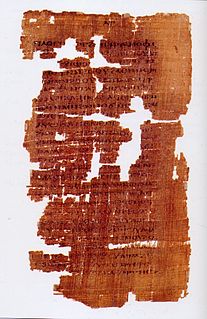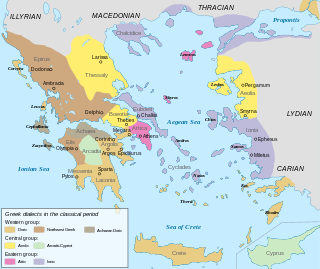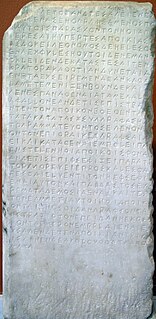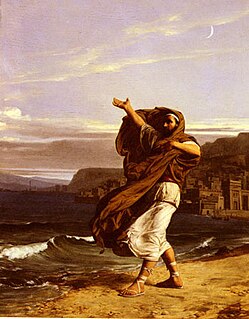
The Hippocratic Oath is an oath historically taken by physicians. It is one of the most widely known of Greek medical texts. In its original form, it requires a new physician to swear, by a number of healing gods, to uphold specific ethical standards. The Oath is the earliest expression of medical ethics in the Western world, establishing several principles of medical ethics which remain of paramount significance today. These include the principles of medical confidentiality and non-maleficence. As the seminal articulation of certain principles that continue to guide and inform medical practice, the ancient text is of more than historic and symbolic value. Swearing a modified form of the Oath remains a rite of passage for medical graduates in many countries.

The League of Corinth, also referred to as the Hellenic League, was a federation of Greek states created by Philip II during the winter of 338 BC/337 BC after the Battle of Chaeronea and succeeded by Alexander the Great at 336 BC, to facilitate the use of military forces in the war of Greece against Persia. The name 'League of Corinth' was invented by modern historians due to the first council of the League being in Corinth. It was the first time in history that most of the Greek states managed to become part of a single political entity. Earlier, in 346 BC, Isocrates urged Philip to unify Greece against the Persians
Isthmian Games or Isthmia were one of the Panhellenic Games of Ancient Greece, and were named after the Isthmus of Corinth, where they were held. As with the Nemean Games, the Isthmian Games were held both the year before and the year after the Olympic Games, while the Pythian Games were held in the third year of the Olympiad cycle.

The Codex Bezae Cantabrigensis, designated by siglum Dea or 05, δ 5, is a codex of the New Testament dating from the 5th century written in an uncial hand on vellum. It contains, in both Greek and Latin, most of the four Gospels and Acts, with a small fragment of 3 John. Written one column per page, the codex contains 406 extant parchment leaves measuring 26 x 21.5 cm, with the Greek text on the left face and the Latin text on the right. A digital facsimile of the codex is available from Cambridge University Library, which holds the manuscript.

Phthora nenano is the name of one of the two "extra" modes in the Byzantine Octoechos—an eight mode system, which was proclaimed by a synod of 792. The phthorai nenano and nana were favoured by composers at the Monastery Agios Sabas, near Jerusalem, while hymnographers at the Stoudiou-Monastery obviously preferred the diatonic mele.
Hexis is a relatively stable arrangement or disposition, for example a person's health or knowledge or character. It is an Ancient Greek word, important in the philosophy of Aristotle, and because of this it has become a traditional word of philosophy. It stems from a verb related to possession or "having", and Jacob Klein, for example, translates it as "possession". It is more typically translated in modern texts occasionally as "state", but more often as "disposition". Joe Sachs translates it as "active condition", in order to make sure that hexis is not confused with passive conditions of the soul, such as feelings and impulses or mere capacities that belong to us by nature. Sachs points to Aristotle's own distinction, explained for example in Categories 8b, which distinguishes the word diathesis, normally uncontroversially translated as disposition. In this passage, diathesis only applies to passive and shallow dispositions that are easy to remove and change, such as being hot or cold, while hexis is reserved for deeper and more active dispositions, such as properly getting to know something in a way that it will not be easily forgotten. Another common example of a human hexis in Aristotle is health and in cases where hexis is discussed in the context of health, it is sometimes translated as "constitution".
The rule of faith is the name given to the ultimate authority or standard in religious belief. It was used by Early Christian writers as Tertullian. The phrase is sometimes used for early creeds.
Lycurgus was a logographer in Ancient Greece. He was one of the ten Attic orators included in the "Alexandrian Canon" compiled by Aristophanes of Byzantium and Aristarchus of Samothrace in the third century BC.
Nature has two inter-related meanings in philosophy. On the one hand, it means the set of all things which are natural, or subject to the normal working of the laws of nature. On the other hand, it means the essential properties and causes of individual things.

The Benedictus, given in Gospel of Luke 1:68-79, is one of the three canticles in the opening chapters of this Gospel, the other two being the "Magnificat" and the "Nunc dimittis". The Benedictus was the song of thanksgiving uttered by Zechariah on the occasion of the circumcision of his son, John the Baptist.

The Second Epistle of Clement often referred to as 2 Clement, is an early Christian writing. It is considered canon by the Coptic Orthodox Church.

The Camuni or Camunni were an ancient population located in Val Camonica during the Iron Age ; the Latin name Camunni was attributed to them by the authors of the 1st century. They are also called ancient Camuni, to distinguish them from the current inhabitants of the valley. The Camunni were among the greatest producers of rock art in Europe; their name is linked to the famous rock engravings of Valcamonica.
The Macedonian–Carthaginian Treaty was an anti-Roman treaty between Philip V of Macedon and Hannibal, leader of the Carthaginians, which was drawn up after the Battle of Cannae when Hannibal seemed poised to conquer Rome. Philip V, who feared Roman expansion, wanted to ride on the coat tails of the victor in the Second Punic War. The discovery of this treaty inevitably led to the outbreak of the First Macedonian War between Rome and its Greek allies against Macedonia.
In 359, the Roman Emperor Constantius II requested a church council, at Constantinople, of both the eastern and western bishops, to resolve the split at the Council of Seleucia. According to Socrates Scholasticus, only about 50 of the Eastern bishops, and an unspecified number of the western ones, actually attended.
Aeinautae were magistrates at Miletus around 600 BC, consisting of the chief men in the state, who obtained the supreme power on the deposition of the tyrants, Thoas and Damasenor. Whenever they wished to deliberate on important matters, they embarked on board ship, put out at a distance from land, and did not return to shore until they had transacted their business.

The Iron Age Greek migrations were effected by a population of émigrés from amidst the displacements and reconstruction that occurred in Greece proper from the middle of the 11th century to end of the 9th century BCE. These movements resulted in the settlement of the Aegean islands, Cyprus, Crete and the western coast of Asia Minor and the founding of new cities which afterwards became centers of the Greek civilization. The migrations were effected in consecutive waves by tribal groupings known as the Aeolic, Ionian, Doric and Achaean (Arcadian) migrations. These movements differed from the Greek colonisation of the Archaic period in that they were more ad hoc affairs instead of the result of a planned process of colonisation on the part of the mother city, and they are less well-documented historically, often with a mythologized or semi-legendary leader such as Hercules or Orestes being recorded as the leader of the colonists.

Brea was an ancient Greek colony in Bisaltia, Thrace, in the lower reaches of Strymon. Nothing is known about the city itself. Nevertheless, the city is considered important by an inscription in which its 446/5 BC founding is mentioned, which is known as the Brea decree, the Brea inscription, or the Brea stone.













